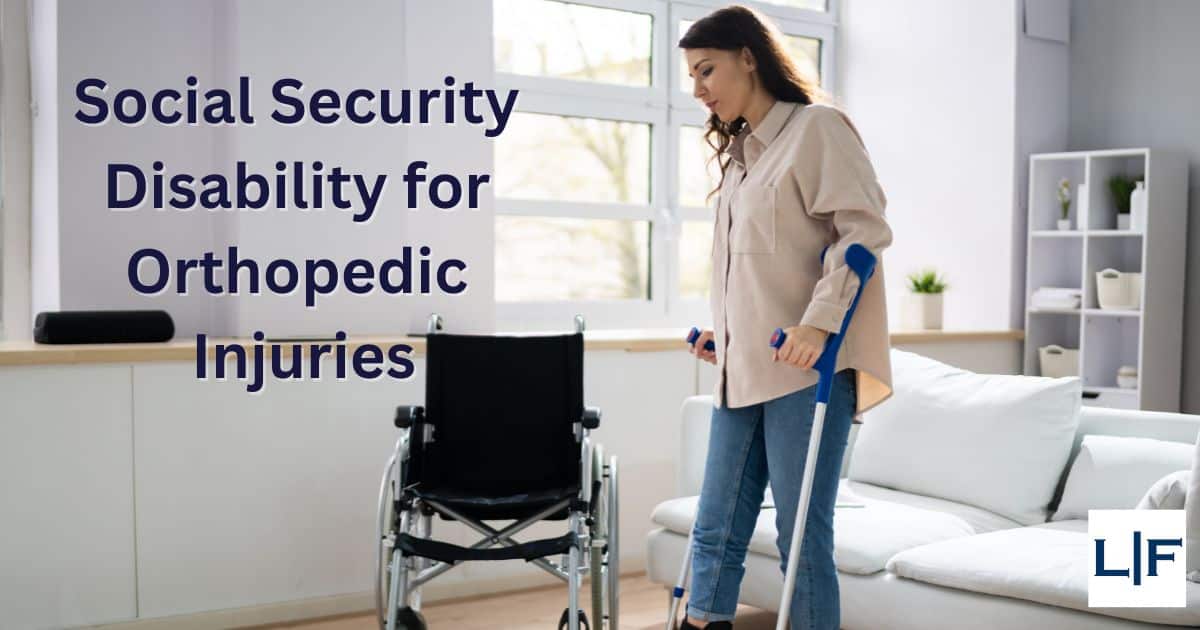Orthopedic injuries involve damage to any part of the musculoskeletal system, including bones, muscles, and joints. While some of them are relatively minor and short-term, there are many orthopedic injuries that can lead to a prolonged period of inactivity or disability.
If you have suffered from orthopedic injuries that are preventing you from working, you might be able to qualify for Social Security disability benefits. We help applicants overcome challenges during the application process by ensuring they have the evidence they need to prove they qualify. For a free consultation with a disability attorney, contact Lunn and Forro, PLLC today at 888-966-6566.
What types of orthopedic injuries might qualify someone as disabled?
There are various types of orthopedic injuries that can be disabling. Below are just a few examples:
- Arthritis
- Bone fractures, e.g., compound fractures with a prolonged healing period, complications, and muscle atrophy
- Ligament and tendon tears around the knee, shoulder, and wrist
- Serious back injuries
- Hip injuries
- Dislocated or separated hips, shoulders, and elbows
- Amputations
- Back Injuries
Will my orthopedic injury meet the SSA’s definition of disabled?
The Social Security has a very strict definition of disabled: “You must not be able to engage in any substantial gainful activity (SGA) because of a medically-determinable physical or mental impairment(s) that is expected to result in death, or that has lasted or is expected to last for a continuous period of at least 12 months.”
There are two ways to meet this definition of disabled:
1. Meet the criteria under a listing in the SSA’s Blue Book.
The SSA maintains a list of impairments that it considers disabling — if claimants meet certain criteria. Most orthopedic conditions in the Blue Book are in Section 1.00-Musculoskeletal System, although you can find other conditions that affect the muscles elsewhere. For example, muscular dystrophy is in Section 11.00-Neurological; arthritis is in Section 14.00-Immune System Disorders.
One of the ways you can qualify as disabled is by satisfying all the criteria for one of the listed conditions. For instance, if you suffered from a broken humerus, you might be able to qualify for benefits if you meet the listing requirements for Section 1.23 – Fracture of an Upper Extremity, which include the following:
- Your imaging tests show that the bone has a nonunion, i.e., it will not heal;
- Medical documentation of an inability to independently initiate, sustain, and complete work-related activities involving fine and gross movements
2. Prove your orthopedic injuries prevent you from working.
If your injuries do not meet a listing, you can still qualify as disabled if your injury, combination of injuries, symptoms, and/or complications limit your ability to work. The claims examiner will review your medical files and complete an RFC, or residual functional capacity assessment.
This evaluation helps the SSA determine what your functional capacities are and whether there are any jobs you can do. For example, if you have a serious, nonhealing humerus fracture, the RFC might show that you are incapable of lifting, pushing, pulling, or reaching overhead.
If the SSA finds that you are incapable of doing the work you once did and that you are incapable of adjusting to new work because of your impairment, it may still consider you disabled.
How do I prove to the SSA that my injuries are disabling?
Comprehensive and up-to-date medical records are your primary resource in proving your disability to the SSA. Collect your files beginning from the day you sustained your injury. This includes your hospital records; surgical evaluations; and your files from orthopedic doctors, physical therapists, and other specialists you have seen.
Make sure your files include imaging tests, medical evaluations, information about the treatments you have undergone and your response to them, and your primary treating physician’s notes about your limitations. The more thorough your medical evidence, the more likely you are to substantiate your claim.
The SSA denies many disability claims based on orthopedic injuries due to lack of sufficient medical evidence or simple mistakes in the application process. We know what evidence the SSA is looking for; we will help you get it to prove your entitlement to benefits.
What are the other requirements for disability benefits?
In addition to meeting the SSA’s definition of disabled, you must also meet certain financial or work credit requirements, depending on which type of disability benefit you are applying for.
- Social Security Disability Insurance benefits (SSDI): SSDI is for disabled workers who worked at a job where they paid Social Security taxes. To qualify, you will need to have a certain number of work credits on your record. The amount of credits you need increases with age.
- Supplemental Security Income (SSI): SSI is for children and disabled people with insufficient work credits that have limited income and resources. To qualify, your household income must be below the current limit and you must have less than $2,000 in resources.
What do I do if the SSA denied my disability claim?
If you already applied for disability benefits and the SSA denied your claim, you have the right to appeal the decision. Contact Lunn and Forro, PLLC in Raleigh to get started on your appeal. We can help you gather additional evidence to substantiate your claim and request that the SSA reconsider its first decision.
Social Security appeals are time-sensitive. You have only 60 days from the date you received your denial to take action, or you might lose your rights to benefits. Call 888-966-6566 to discuss your case today
Related Posts

If I Get Disability Benefits Will My Family Also Get Money?
If you are approved for SSDI payments there may be additional money available to your minor children, your spouse, and your disabled adult children. When

Can Disabled Veterans Get Social Security Disability?
Disabled veterans may qualify for both Social Security disability benefits and veterans disability compensation. If you meet the separate requirements of each type of benefit,

How Long Can You Receive Social Security Disability Benefits?
You can receive disability benefits as long as you continue to be eligible. The eligibility rules are different for SSDI and SSI benefits.

Does My Spouse’s Income Affect Social Security Disability Benefits?
Yes, your spouse’s income may affect your Social Security disability benefits, although it depends on the type of benefit you receive.
Will I get Medicare or Medicaid benefits?
Medicaid and Medicare are medical benefits that come with a finding that you are disabled by the Social Security Administration. If you receive SSDI benefits,
Social Security Back pay
The Social Security disability application process can seem rather long and tiring. The Social Security Administration (SSA) receives roughly 2.5 million applications for disability benefits



